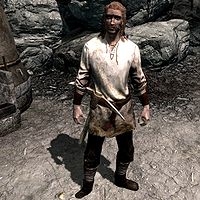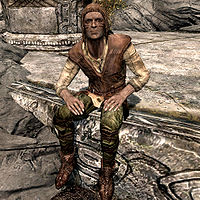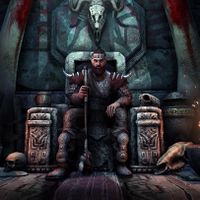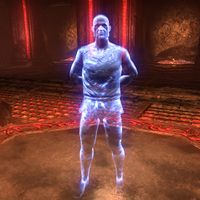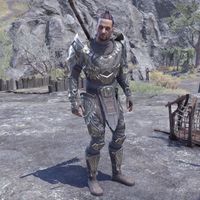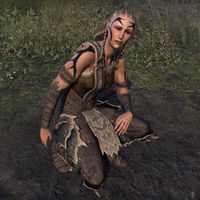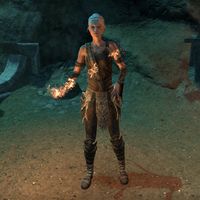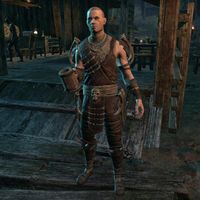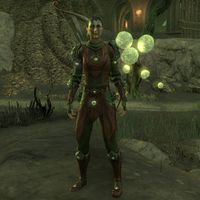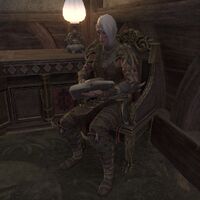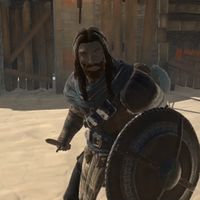Lore:Imperialized Reachfolk
Imperialized Reachfolk are Reachmen who have assimilated into Imperial lands.[1] During the Second Era, especially during the reign of the Longhouse Emperors, a larger number of Reachfolk than ever ventured out in search of their fortunes.[2] Some of them were found in service of the Emperor Moricar, and in his Imperial Guard.[3][4] Moricar's son, Leovic was regarded as the most Imperialized among the Reachfolk Emperors.[5] Entire clans could be found within Cyrodiil.[6] While they were eventually expelled from Cyrodiil during the reign of Varen Aquilarios,[7][8][9] by 2E 582, some could still be encountered in the former Imperial territories, including the Heartlands,[10] Blackwood,[11][12] and the West Weald.[13] Some of them expressed longing for the times of the Longhouse Emperors.[14] Many of them eventually made their way back to the Reach.[4][3][15] Reachfolk could also be found in various other territories, traveled abroad to the lands of Aldmeri Dominion, Daggerfall Covenant, and Ebonheart Pact,[16] and could also be encountered in foreign lands,[17] affiliating themselves with various foreign factions,[18][19][20] and some even delving into the realms of Oblivion, such as Fargrave,[21][22][23] the Deadlands,[24] and Apocrypha.[25][26][27] Reachfolk were present abroad and engaged in political and diplomatic missions on behalf of their nation in Cyrodiil and Valenwood.[28][29]
After the imperialization and the loss of independence, some Reachmen of Markarth and surrounding areas embraced the worship of the Eight Divines, believing that certain aspects of their traditional practices were best left in the past.[30][31][32]
The Reachfolk of Markarth, known as the Freehands of Markarth,[33] while still of the Reach, were exposed to more foreign influences than the Wilders, and were known to import foreign goods.[34] They had a higher literacy rate,[3] and access to more commodities,[35] and differed culturally to some degree from the Wilders.[36] Clans new to Markarth were known for different cultural behaviors compared to those accustomed to city life.[37]
Gallery[edit]
Ard Caddach, a Reachman who received Imperial education and military training (ESO)
Emperor Leovic, the most Imperialized and cosmopolitan of the Longhouse Emperors (ESO)
A Reachman mage of the Mages Guild's Skingrad branch (ESO)
References[edit]
- ^ Tisfira's dialogue in ESO: Markarth
- ^ History of Markarth: A Story in Stone — Consul Cardea, the Ard's Administrator
- ^ a b c Arloakh's dialogue in ESO: Markarth
- ^ a b Arana's dialogue during The Awakening Darkness in ESO: Markarth
- ^ Secret History of the Longhouse Emperors — Councilor Vandacia
- ^ Medresi Guvron's dialogue in ESO: Markarth
- ^ Arvnir's dialogue during The Frozen Isle in ESO: Harrowstorm
- ^ Meet the Character - Mother Ciannait — Optio Cornelia Midara
- ^ Chronicles of the Five Companions 5 — Abnur Tharn
- ^ The Rat's dialogue in ESO: Imperial City
- ^ Trano Coventina's dialogue in ESO
- ^ Gellsoane in ESO
- ^ Isolelme, Anaennel, Jerntann, Dorelva, Mursold, and Devparn in ESO
- ^ Isolelme's dialogue in ESO
- ^ Senan in ESO: Markarth
- ^ Bastheladir's dialogue in ESO: Markarth
- ^ Giraud Scraeg's dialogue in ESO
- ^ Agents and Reagents: The Bounty of Mundus — David S. J. Hodgson
- ^ Hroltar the Boaster's dialogue in ESO
- ^ Sibellec the Old's dialogue in ESO
- ^ Kelaer in ESO
- ^ Iglytha in ESO
- ^ The Anchorite's dialogue in ESO
- ^ Caruggan in ESO
- ^ Cipher Cianrella in ESO
- ^ Cipher Devkeln in ESO
- ^ Bernollach in ESO
- ^ Commandant Salerius' dialogue in ESO: Gold Road
- ^ Ambassador Goronwy's dialogue in ESO
- ^ Belchimac's dialogue in Skyrim
- ^ Cedran's dialogue in Skyrim
- ^ Degaine's dialogue in Skyrim
- ^ Ard Caddach's dialogue in ESO: Markarth
- ^ Vlindrel Hall Bill of Lading — Herminia Corvinus
- ^ Bretull's dialogue in ESO: Markarth
- ^ Ansvyn's dialogue in ESO: Markarth
- ^ Beirrulla's dialogue in ESO: Markarth
| ||||||||||||||||||||||||||||||||||||||||||||||||||||||||
